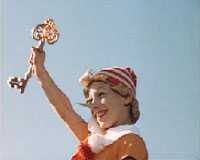Buratino


Buratino (Russian: Буратино) is the main character of the book The Golden Key, or the Adventures of Buratino (1936) by Aleksey Nikolayevich Tolstoy. Based on the 1883 novel The Adventures of Pinocchio by Carlo Collodi, Buratino originated as a character in the commedia dell'arte. The name Buratino is derived from the Italian burattino, which means wooden puppet or doll.[1] The book was published in 1936, and Buratino quickly became hugely popular among children in the Soviet Union, and remains so to this day. The story has been made into several films, including in 1959 and in 1975.
Origin
According to Tolstoy, he had read Pinocchio as a child, but, having lost the book, he started re-imagining it many years later in an attempt to come up with a series of bedside stories for his own children. The resulting story turned out to be so original and became so loved by the writer's children, that he decided to put it to paper and publish it.
Plot
Like Pinocchio, Buratino is a long-nosed wooden puppet. According to the story, he is carved by Papa Carlo from a log, and suddenly comes to life. Upon creation, Buratino comes out long-nosed due to Papa Carlo's sloppy woodworking. Papa Carlo tries to shorten it, but Buratino resists.
Papa Carlo then sells his only good jacket in order to buy textbooks for Buratino and sends him to school. However, the boy becomes distracted by an advertisement for a local puppet theater show, and sells his textbooks to buy a ticket to the show. There he befriends other puppets, but the evil puppetmaster Karabas Barabas wants to destroy him because Buratino disrupted the show.
Karabas Barabas releases Buratino after he learns that Papa Carlo's home contains a secret door for which Karabas has been searching. A Golden Key that Karabas once possessed, but later lost, opens this secret door. Karabas releases Buratino and even gives him five gold coins, asking only that Buratino watch after his father's home and make sure they do not move.
The story proceeds to tell of Buratino and his friends' hunt for the Golden Key, and their struggles against the evil Karabas, his loyal friend Duremar, as well as a couple of crooks: Alice the Fox and Basilio the Cat, who are after Buratino's coins.
Characters
- Buratino is a wooden puppet with a long nose.
- Papa Carlo (Russian: папа Карло) is a barrel organ player of little means, who created Buratino.
- Giuseppe (Джузеппе), nicknamed "Giuseppe the Blue Nose" for always being drunk, is a woodworker and a friend of Carlo. He wanted to make a table leg from the talking log, but got scared and finally gave the log as a present to Papa Carlo.
- Karabas Barabas (Карабас-Барабас) is an evil puppeteer. He owns a puppet theater with lots of marionettes, including Malvina, Pierrot, and Harlequin.
- Malvina (Мальвина) is a beautiful female puppet with blue hair.
- Artemon (Артемон) is Malvina's loyal poodle.
- Pierrot (Пьеро) is a sad puppet and a poet who is deeply in love with Malvina.
- Harlequin (Арлекино) is Pierrot's scene partner in Karabas' theatre. He usually mocks and beats Pierrot.
- Alice the Fox (Лиса Алиса) and Basilio the Cat (Кот Базилио), two swindlers.
- Tortilla the Turtle (Черепаха Тортила) gives the Golden Key to Buratino, the same key that was lost by Karabas.
- Duremar (Дуремар) is a friend of Karabas Barabas who catches leeches for a living and so disturbs Tortilla's pond.
Adaptations
- Golden Key, a 1939 movie combining live action and stop-motion animation.
- The Adventures of Buratino (1959 film), a 1959 cartoon.
- The Adventures of Buratino (1975 film), a 1975 TV film.
- Buratino, Son of Pinocchio, a 2009 film.
- Buratino, Goa song made by Terranoise, a Goa producer
In popular culture
The name Buratino has and continues to be used as branding for a variety of products and stores marketed to children in the ex-Soviet Union and Russia — most notable of these is the Buratino brand soft drink, known for its caramel taste.
Buratino is also the nickname of the TOS-1 multiple launch rocket system, due to the big "nose" of the launcher.
A location in the story, По́ле Чуде́с в Стране́ Дурако́в, literally "The Field of Wonders in the Land of Fools", is used as the name of the Russian adaptation of the American game show Wheel of Fortune.
"The Land of Fools" (in the book a place where "The Field of Wonders" was situated, and where Buratino was scammed) has become an idiom in the Russian language, meaning "a country where people get scammed" and "a place to make easy (shady) business money" - both referring to Russia itself.
"Burattino telecomandato" ("Telecommanded wooden puppet") is an easy-listening song performed by Italian singer Pupo in 1982, but it does not speak about this topic.
References
- Notes
External links
| Wikimedia Commons has media related to Buratino. |
- Buratino at sunbirds.com
- Internet Movie Database:
- 1939 film
- 1960 film
- 1975 film
- 2009 film
- 1998 television episode (same as 1960 film, but with American soundtrack and voices)